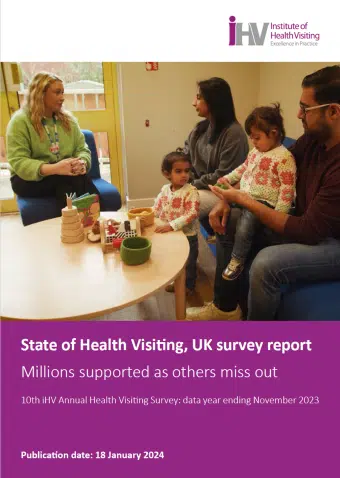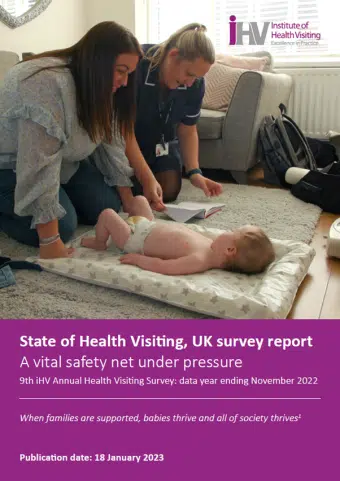The Institute of Health Visiting (iHV) publishes its findings from the largest UK survey of frontline health visitors working with families with babies and young children across the UK – “State of Health Visiting, UK Survey Report: Millions supported as others miss out”.
It’s deeply shocking that 93% of health visitors reported an increase in the number of families affected by poverty in the last 12 months. Poverty was the cause of greatest concern to health visitors. They visit the homes that families are struggling to heat and witness the impossible choices that parents are forced to make about feeding their children or paying the bus fare to attend vital health appointments. These struggles are often hidden behind front doors and invisible to other services until the situation reaches crisis point. Alongside an increase in poverty affecting families over the last 12 months:
- 89% of health visitors reported an increase in the use of food banks
- 78% an increase in perinatal mental illness
- 69% an increase in domestic abuse
- 63% an increase in homelessness and asylum seekers
- 50% an increase in families skipping meals as a result of the cost-of-living crisis.
Only 3% of health visitors surveyed reported that families had not been impacted by the cost-of-living crisis. Some reported that poverty was so widespread that it had become the norm.
In our survey, health visitors also raised concerns about the wider impacts of poverty and increased parental struggle on children’s health, development and safety. The Government’s own data show that more children in England are falling behind with their development and health inequalities are widening. Worryingly, the situation is getting worse and showing no signs of recovery.
The good news is that health visitors saw millions of families last year, reaching significantly more babies and young children than any other health service or early years agency. However, despite health visitors’ best efforts, they are not able to meet the scale of rising need. Too many babies and young children are not receiving packages of support to improve their health and development when they need it, due to ongoing cuts to the health visitor workforce:
- There is a national shortage of around 5,000 health visitors in England and families face a postcode lottery of support.
- 79% of health visitors said that the health visiting service lacked capacity to offer a package of support to all children with identified needs.
- Only 45% of health visitors were “confident” or “very confident” that their service was able to meet the needs of vulnerable babies and children when a need is identified.
- 80% of health visitors said that other services were also stretched and lacked capacity to pick up onward referrals for children with additional needs. Thresholds for children’s social care support had increased and other services had long waiting lists.
Alison Morton, CEO at the Institute of Health Visiting, says,
“Consistently, health visitors have told us that parenting has become much harder for many families over the last 12 months. Health visitors are in a privileged position, they see firsthand the struggles that families with babies and young children are facing, often hidden behind front doors and invisible to other services. Sadly, despite policy promises, more and more children are not getting the “best start in life”. And the situation is getting worse with more children falling behind with their development and widening health inequalities. As babies can’t speak for themselves, health visitors provide a vital “voice” for our youngest citizens and an important warning signal for policymakers who are prepared to listen. It doesn’t have to be this way, change is possible.”
We publish at the start of a new year, with political and economic uncertainty, but also with hope as all political parties consider their plans to improve the health of our nation ahead of a general election expected this year. Our survey findings highlight the incredible potential and desire within the health visiting profession to support a brighter future for our nation’s children. But we cannot ignore the fact that the health visiting workforce is under significant pressure with unacceptable levels of work-related stress, as health visitors manage enormous caseloads, and escalating levels of need and vulnerability. We urgently need more health visitors.
Alison concludes:
“Our survey findings present a clear imperative to act. If we get the early years right, we can avoid so much harm later in life. The cuts to health visiting in England over the last 8 years have been a false economy. When sufficiently resourced, health visitors can take pressure off busy A&E departments and GPs, providing support for families in the heart of the community. The costs to rebuild the health visiting service in England are small compared to the spiralling costs of NHS treatment, child maltreatment and cumulative costs across the life course. Investing in our children’s health is not only the right thing to do, it also makes sound economic sense.”
To cite this report, please use the link to the pdf here: https://bit.ly/48W6TcE






